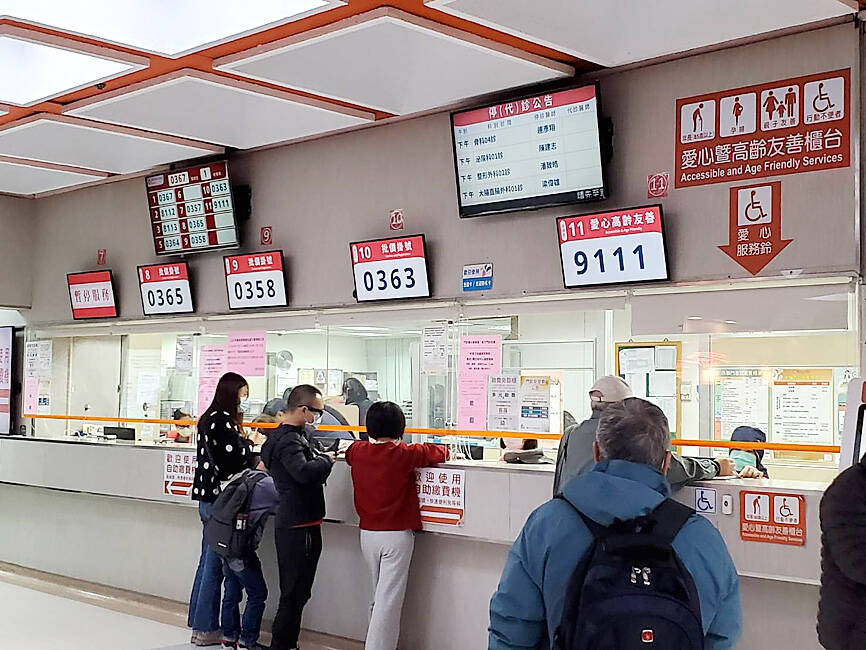The Ministry of Health and Welfare yesterday announced that it would launch an online medical information platform, saying that its short-term goal is facilitating the sharing of healthcare data between medical centers, so that patients would not need to request copies of their files.
The Department of Information Management said one of the greatest challenges of smart healthcare development in Taiwan is the fragmentation of healthcare data, as hospitals have developed their own electronic medical record systems.
Although Taiwan has an advanced healthcare system and a strong information industry, healthcare information cannot be shared between hospitals due to the lack of a standardized data format, Deputy Minister of Health and Welfare Lue Jen-der (呂建德) said.

Photo: Lin Hui-chin, Taipei Times
The launch of Fast Healthcare Interoperability Resources (FHIR), a standardized electronic healthcare data storage system, would allow smooth exchanges of data between hospitals, Lue said.
Department of Information Management Director Lee Chien-chang (李建璋) said the three core focuses of the new platform are: “data unification,” “rules unification” and “application unification.”
The first goal of data unification is to have a nationwide unified format for electronic medical records, Lee said.
Different countries have different FHIR implementation standards, he said, adding that there are 23 countries that have established their FHIR implementation guidelines.
The ministry hopes to initially allow at least the 109 most common items in medical records, such as gender, age, height, and chronic conditions and medications, to be exchanged between 23 medical centers in the next two years.
The ministry would introduce a clinical quality language (CQL), a standardized and domain-specific programming language, as well as a rule library to achieve rule unification, he said.
Through the CQL, hospitals would be able to automatically check if their diagnoses and prescriptions meet the required standards, which would improve service efficiency, he said.
The ministry would also set up an artificial intelligence (AI) medical application ecosystem similar to Apple and Google’s app stores to achieve application unification, so that hospitals can freely download and apply AI technology to improve their clinical decisionmaking efficiency, he added.

Right-wing political scientist Laura Fernandez on Sunday won Costa Rica’s presidential election by a landslide, after promising to crack down on rising violence linked to the cocaine trade. Fernandez’s nearest rival, economist Alvaro Ramos, conceded defeat as results showed the ruling party far exceeding the threshold of 40 percent needed to avoid a runoff. With 94 percent of polling stations counted, the political heir of outgoing Costa Rican President Rodrigo Chaves had captured 48.3 percent of the vote compared with Ramos’ 33.4 percent, the Supreme Electoral Tribunal said. As soon as the first results were announced, members of Fernandez’s Sovereign People’s Party

MORE RESPONSIBILITY: Draftees would be expected to fight alongside professional soldiers, likely requiring the transformation of some training brigades into combat units The armed forces are to start incorporating new conscripts into combined arms brigades this year to enhance combat readiness, the Executive Yuan’s latest policy report said. The new policy would affect Taiwanese men entering the military for their compulsory service, which was extended to one year under reforms by then-president Tsai Ing-wen (蔡英文) in 2022. The conscripts would be trained to operate machine guns, uncrewed aerial vehicles, anti-tank guided missile launchers and Stinger air defense systems, the report said, adding that the basic training would be lengthened to eight weeks. After basic training, conscripts would be sorted into infantry battalions that would take

GROWING AMBITIONS: The scale and tempo of the operations show that the Strait has become the core theater for China to expand its security interests, the report said Chinese military aircraft incursions around Taiwan have surged nearly 15-fold over the past five years, according to a report released yesterday by the Democratic Progressive Party’s (DPP) Department of China Affairs. Sorties in the Taiwan Strait were previously irregular, totaling 380 in 2020, but have since evolved into routine operations, the report showed. “This demonstrates that the Taiwan Strait has become both the starting point and testing ground for Beijing’s expansionist ambitions,” it said. Driven by military expansionism, China is systematically pursuing actions aimed at altering the regional “status quo,” the department said, adding that Taiwan represents the most critical link in China’s

‘REALLY PROUD’: Nvidia would not be possible without Taiwan, Huang said, adding that TSMC would be increasing its capacity by 100 percent Nvidia Corp CEO Jensen Huang (黃仁勳) on Saturday praised and lightly cajoled his major Taiwanese suppliers to produce more to help power strong demand for artificial intelligence (AI), capping a visit to the country of his birth, where he has been mobbed by adoring fans at every step. Speaking at an impromptu press conference in the rain outside a Taipei restaurant, where he had hosted suppliers for a “trillion-dollar dinner,” named after the market capitalization of those firms attending, Huang said this would be another good year for business. “TSMC needs to work very hard this year because I need a lot